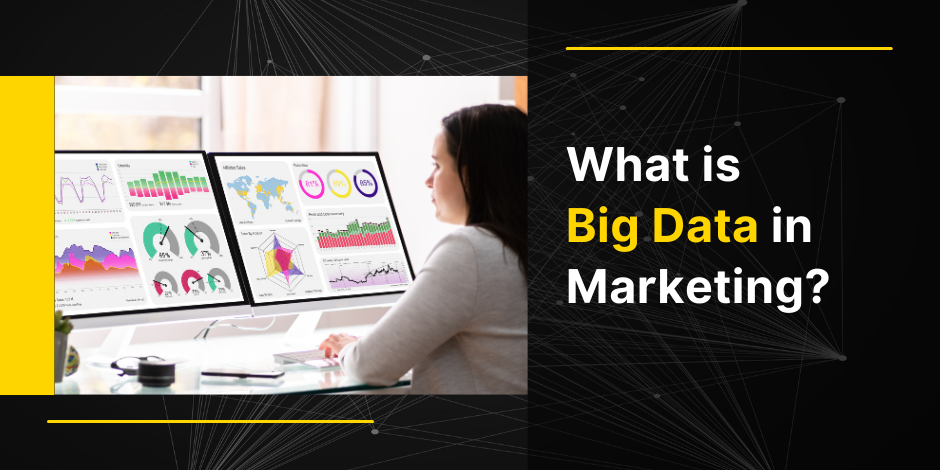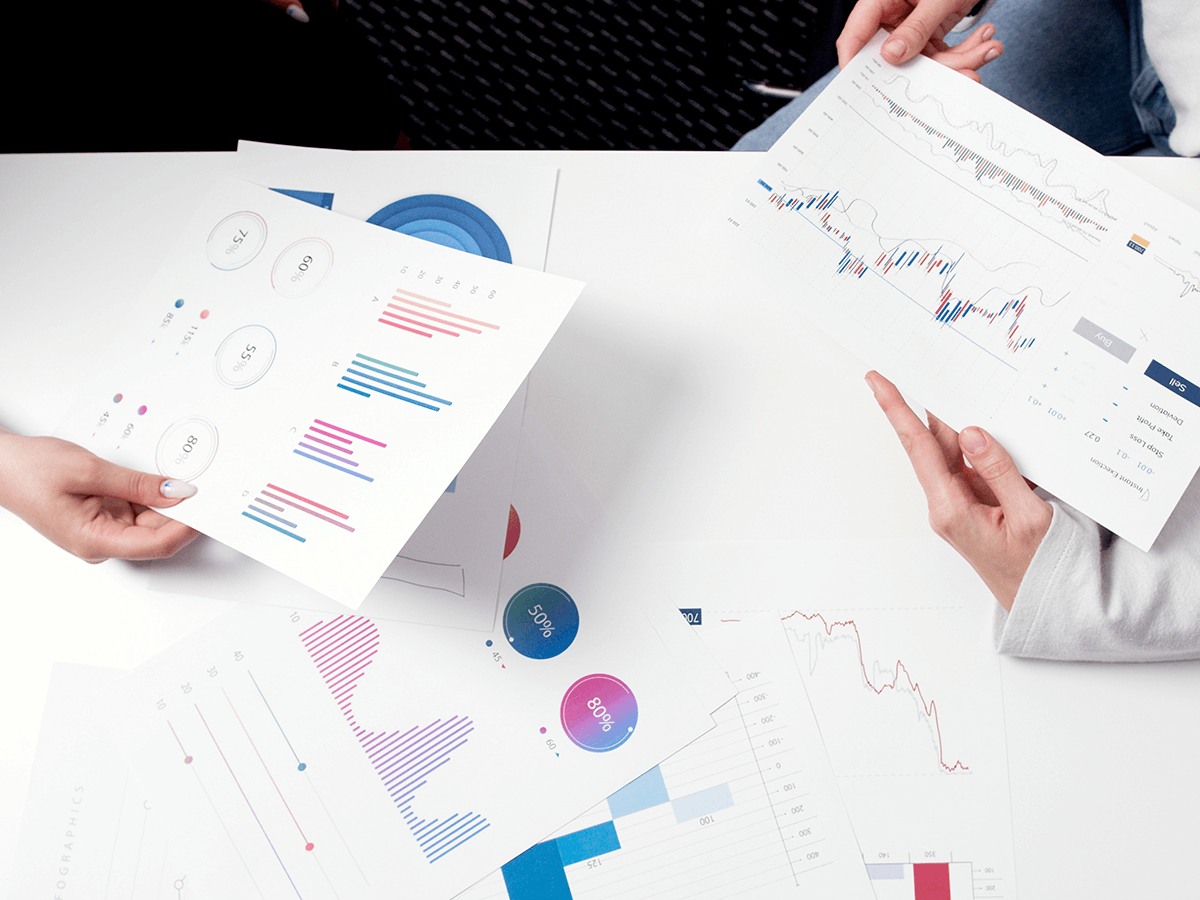What is Big Data in Marketing?

Stay Informed With Our Weekly Newsletter
Receive crucial updates on the ever-evolving landscape of technology and innovation.
Understanding Big Data in Marketing
In today’s digital age, data has become the lifeblood of successful marketing strategies. The vast amount of information available provides valuable insights into customer behaviour, preferences, and trends.
In 2022, the global big data analytics market was valued at $271.83 billion and is projected to grow to $745.15 billion by 2030.
We explore its role and benefits, discuss the challenges in implementing it, and highlight its future prospects.
The concept of big data

Big data in marketing refers to the vast and complex sets of information generated by various sources, such as social media platforms, websites, and customer interactions.
It encompasses both structured and unstructured data and includes text, images, video, and more.
The sheer volume, velocity, and variety of data make it difficult to process and analyse using traditional methods. With the advent of the digital age, the world has witnessed an unprecedented explosion of data.
Every click, every like, every share, and every purchase generates a digital footprint, contributing to the ever-growing pool of big data. This data is a treasure trove of insights, waiting to be unlocked and harnessed for various purposes.
Imagine a world where every interaction, every transaction, and every online activity is recorded and stored. This is the reality of big data.
It is a vast ocean of information, constantly expanding and evolving, shaping the way we live, work, and interact with the world.
Defining big data
Big data in marketing can be defined as the massive amount of information that is generated, collected, and stored by businesses and organisations.
It encompasses not only the data produced internally but also the data obtained from external sources, such as online interactions and social media. Big data is characterised by its volume, velocity, and variety, requiring advanced tools and techniques for analysis.
When we talk about big data, we are not just referring to a large quantity of data. We’re also talking about the speed at which this data is generated and the diversity of its sources.
The volume of data is mind-boggling, with estimates suggesting that by 2025, there will be 175 zettabytes of data in existence.
To put that into perspective, one zettabyte is equivalent to a trillion gigabytes!
Moreover, big data is not limited to structured information that fits neatly into rows and columns. It includes unstructured data, such as social media posts, emails, and multimedia content.
This unstructured data poses a unique challenge as it requires sophisticated algorithms and machine learning techniques to extract meaningful insights.
The evolution of big data
The concept of big data in marketing has evolved over the years with the advancements in technology and the exponential growth of digital information.
Traditional data analysis methods were limited in their ability to handle large datasets, but with the emergence of new technologies, businesses can now collect, store, and analyse vast amounts of data in real-time.
One of the key drivers of the big data revolution is the development of cloud computing. Cloud platforms provide scalable and cost-effective solutions for storing and processing massive datasets.
This has democratised access to big data analytics, allowing businesses of all sizes to leverage the power of data-driven insights.
Another significant development in the world of big data is the rise of artificial intelligence (AI) and machine learning (ML). These technologies enable computers to learn from data and make intelligent predictions or decisions.
With the help of AI and ML algorithms, businesses can uncover hidden patterns, detect anomalies, and make data-driven decisions at a speed and scale that was unimaginable in the past.
Furthermore, the evolution of big data in marketing has paved the way for the Internet of Things (IoT), which refers to the network of interconnected devices that collect and exchange data.
From smart homes to connected cars, IoT devices generate a massive amount of data that can be analysed to improve efficiency, enhance safety, and drive innovation.
The role of big data in marketing

Big data plays a crucial role in modern marketing strategies by providing businesses with valuable insights about their customers. Let’s explore two key aspects of this role:
Enhancing customer understanding
With big data, businesses can gain a deeper understanding of their customers’ preferences, behaviours, and buying patterns.
By analysing large datasets, marketers can identify trends, segment their target audience, and tailor their marketing campaigns accordingly. This allows for more personalised and targeted messaging, resulting in higher customer satisfaction and improved conversion rates.
Predictive analytics and market trends
Big data allows marketers to predict future trends and consumer behaviour based on historical data and real-time analysis. By leveraging predictive analytics, businesses can anticipate market demands, optimise pricing strategies, and identify potential opportunities for growth.
This proactive approach gives marketers a competitive edge and enables them to stay ahead in the dynamic and ever-changing landscape of the market.
The benefits of big data in marketing
Implementing a robust big data strategy offers numerous benefits for businesses. Let’s explore two significant advantages:
Improved decision-making
Big data provides marketers with actionable insights that can inform their decision-making processes. By analysing vast amounts of data, businesses can make informed choices about pricing, product development, and marketing strategies.
This data-driven approach minimises risks, enhances operational efficiency, and increases the likelihood of successful outcomes.
Personalisation and customer engagement
One of the biggest advantages of big data in marketing is the ability to deliver personalised experiences to customers.
By analysing customer data, businesses can create targeted marketing campaigns, recommend relevant products, and offer tailored promotions.
This level of personalisation fosters stronger customer relationships, boosts loyalty, and drives engagement.
Challenges in implementing big data
While big data in marketing holds immense potential, its implementation comes with its own set of challenges. Let’s explore two common hurdles:
Data privacy and security concerns
The collection and analysis of big data in marketing raise concerns about privacy and security. Handling large volumes of customer data requires stringent measures to protect sensitive information and comply with data protection regulations.
Businesses must prioritise data security to build trust among customers and mitigate the risks associated with data breaches.
The issue of data quality
Ensuring the quality of big data is another challenge faced by businesses. With the vast amount of information available, there is a risk of inaccuracies, incompleteness, or inconsistency in the data.
Implementing robust data management practices, such as data cleansing and validation, is crucial to maintaining data integrity and reliability for effective analysis and decision-making.
Future prospects of big data in marketing

The future of big data in marketing holds exciting possibilities. Here are two areas to watch:
The rise of AI and machine learning
Artificial intelligence (AI) and machine learning are revolutionising the way businesses harness big data.
By automating data analysis processes, AI-powered systems can uncover patterns, generate insights, and deliver actionable recommendations.
This enables marketers to make data-driven decisions faster, more accurately, and at scale.
The potential of real-time data analysis
The ability to analyse big data in real-time opens up vast opportunities for marketers. With real-time data analysis, businesses can respond to customer needs and market trends quickly.
This allows for agile decision-making, personalised campaigns, and immediate actions, resulting in enhanced customer satisfaction and competitive advantage.
In conclusion
Understanding big data in marketing is essential for businesses to thrive in today’s digital landscape.
By grasping the concept, harnessing its power, and overcoming the associated challenges, marketers can leverage big data to gain valuable customer insights, drive personalised experiences, improve decision-making, and embrace the exciting possibilities that the future holds.
Ready to explore the limitless possibilities that big data can offer your marketing career? Schedule a free consultation with us today to discuss your aspirations and uncover a personalised path into the world of data-driven careers.




